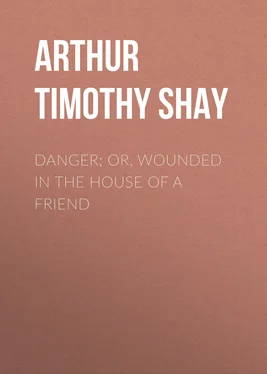Timothy Arthur - Danger; Or, Wounded in the House of a Friend
Здесь есть возможность читать онлайн «Timothy Arthur - Danger; Or, Wounded in the House of a Friend» — ознакомительный отрывок электронной книги совершенно бесплатно, а после прочтения отрывка купить полную версию. В некоторых случаях можно слушать аудио, скачать через торрент в формате fb2 и присутствует краткое содержание. Жанр: foreign_sf, literature_19, foreign_antique, foreign_prose, на английском языке. Описание произведения, (предисловие) а так же отзывы посетителей доступны на портале библиотеки ЛибКат.
- Название:Danger; Or, Wounded in the House of a Friend
- Автор:
- Жанр:
- Год:неизвестен
- ISBN:нет данных
- Рейтинг книги:3 / 5. Голосов: 1
-
Избранное:Добавить в избранное
- Отзывы:
-
Ваша оценка:
- 60
- 1
- 2
- 3
- 4
- 5
Danger; Or, Wounded in the House of a Friend: краткое содержание, описание и аннотация
Предлагаем к чтению аннотацию, описание, краткое содержание или предисловие (зависит от того, что написал сам автор книги «Danger; Or, Wounded in the House of a Friend»). Если вы не нашли необходимую информацию о книге — напишите в комментариях, мы постараемся отыскать её.
Danger; Or, Wounded in the House of a Friend — читать онлайн ознакомительный отрывок
Ниже представлен текст книги, разбитый по страницам. Система сохранения места последней прочитанной страницы, позволяет с удобством читать онлайн бесплатно книгу «Danger; Or, Wounded in the House of a Friend», без необходимости каждый раз заново искать на чём Вы остановились. Поставьте закладку, и сможете в любой момент перейти на страницу, на которой закончили чтение.
Интервал:
Закладка:
"Nothing has been heard of Archie Voss since he left Mr. Birtwell's last night, and his poor mother is lying insensible, broken down by her fears."
"Oh, what of her? I was called for in the night, and you went in my place."
"I found Mrs. Voss in a state of coma, from which she had only partially recovered when I left at daylight. Mr. Voss is in great anxiety about his son, who has never stayed away all night before, except with the knowledge of his parents."
"Oh, that will all come right," said Dr. Hillhouse. "The young man went home, probably, with some friend. Had too much to drink, it may be, and wanted to sleep it off before coming into his mother's pressence."
"There is no doubt about his having drank too much," returned Dr. Angier. "I saw him going along the hall toward the street door in rather a bad way. He had his overcoat on and his hat in his hand."
"Was any one with him?"
"I believe not. I think he went out alone."
"Into that dreadful storm?"
"Yes."
The countenance of Dr. Hillhouse became very grave:
"And has not been heard of since?"
"No."
"Have the police been informed about it?"
"Yes. The police have had the matter in hand for several hours, but at the time I left not the smallest clue had been found."
"Rather a bad look," said Dr. Hillhouse. "What does Mr. Voss say about it?"
"His mind seems to dwell on two theories—one that Archie, who had a valuable diamond pin and a gold watch, may have wandered into some evil neighborhood, bewildered by the storm, and there been set upon and robbed—murdered perhaps. The other is that he has fallen in some out-of-the-way place, overcome by the cold, and lies buried in the snow. The fact that no police-officer reports having seen him or any one answering to his description during the night awakens the gravest fears."
"Still," replied Dr. Hillhouse, "it may all come out right. He may have gone to a hotel. There are a dozen theories to set against those of his friends."
After remaining silent for several moments, he said:
"The boy had been drinking too much?"
"Yes; and I judge from, his manner, when I saw him on his way to the street, that he was conscious of his condition and ashamed of it. He went quietly along, evidently trying not to excite observation, but his steps were unsteady and his sight not true, for in trying to thread his way along the hall he ran against one and another, and drew the attention he was seeking to avoid."
"Poor fellow!" said Dr. Hillhouse, with genuine pity. "He was always a nice boy. If anything has happened to him, I wouldn't give a dime for the life of his mother."
"Nor I. And even as it is, the shock already received may prove greater than her exhausted system can bear. I think you had better see her, doctor, as early as possible."
"There were no especially bad symptoms when you left, beyond the state of partial coma?"
"No. Her respiration had become easy, and she presented the appearance of one in a quiet sleep."
"Nature is doing all for her that can be done," returned Dr. Hillhouse. "I will see her as early as practicable. It's unfortunate that we have these two cases on our hands just at this time, and most unfortunate of all that I should have been compelled to go out so early this morning. That doesn't look right."
And the doctor held up his hand, which showed a nervous unsteadiness.
"It will pass off after you have taken breakfast."
"I hope so. Confound these parties! I should not have gone last night, and if I'd given the matter due consideration would have remained at home."
"Why so?"
"You know what that means as well as I do;" and Dr. Hillhouse held up his tremulous hand again. "We can't take wine freely late at night and have our nerves in good order next morning. A life may depend on a steady hand to-day."
"It will all pass off at breakfast-time. Your good cup of coffee will make everything all right."
"Perhaps yea, perhaps nay," was answered. "I forgot myself last night, and accepted too many wine compliments. It was first this one and then that one, until, strong as my head is, I got more into it than should have gone there. We are apt to forget ourselves on these occasions. If I had only taken a glass or two, it would have made little difference. But my system was stimulated beyond its wont, and, I fear, will not be in the right tone to-day."
"You will have to bring it up, then, doctor," said the assistant. "To touch that work with an unsteady hand might be death."
"A glass or two of wine will do it; but when I operate, I always prefer to have my head clear. Stimulated nerves are not to be depended upon, and the brain that has wine in it is never a sure guide. A surgeon must see at the point of his instrument; and if there be a mote or any obscurity in his mental vision, his hand, instead of working a cure, may bring disaster."
"You operate at twelve?"
"Yes."
"You will be all right enough by that time; but it will not do to visit many patients. I am sorry about this case of child-bed fever; but I will see it again immediately after breakfast, and report."
While they were still talking the bell rang violently, and in a few moments Mr. Ridley came dashing into the office. His face wore a look of the deepest distress.
"Oh, doctor, he exclaimed can't you do something for my wife? She'll die if you don't. Oh, do go to her again!"
"Has any change taken place since we left?" asked Dr. Hillhouse, with a professional calmness it required some effort to assume.
"She is in great distress, moaning and sobbing and crying out as if in dreadful pain, and she doesn't know anything you say to her."
The two physicians looked at each other with sober faces.
"You'd better see her again," said Dr. Hillhouse, speaking to his assistant.
"No, no, no, Dr. Hillhouse! You must see her yourself. It is a case of life and death!" cried out the distracted husband. "The responsibility is yours, and I must and will hold you to that responsibility. I placed my wife in your charge, not in that of this or any other man."
Mr. Ridley was beside himself with fear. At first Dr. Hillhouse felt like resenting this assault, but he controlled himself.
"You forget yourself, Mr. Ridley," he answered in a repressed voice. "We do not help things by passion or intemperance of language. I saw your wife less than half an hour ago, and after giving the utmost care to the examination of her case made the best prescription in my power. There has not been time for the medicines to act yet. I know how troubled you must feel, and can pardon your not very courteous bearing; but there are some things that can and some things that cannot be done. There are good reasons why it will not be right for me to return to your house now—reasons affecting the safety, it may be the life, of another, while my not going back with you can make no difference to Mrs. Ridley. Dr. Angier is fully competent to report on her condition, and I can decide on any change of treatment that may be required as certainly as if I saw her myself. Should he find any change for the worse, I will consider it my duty to see her without delay."
"Don't neglect her, for God's sake, doctor!" answered Mr. Ridley, in a pleading voice. His manner had grown subdued. "Forgive my seeming discourtesy. I am wellnigh distracted. If I lose her, I lose my hold on everything. Oh, doctor, you cannot know how much is at stake. God help me if she dies!"
"My dear sir, nothing in our power to do shall be neglected. Dr. Angier will go back with you; and if, on his return, I am satisfied that there is a change for the worse, I will see your wife without a moment's delay. And in the mean time, if you wish to call in another physician, I shall be glad to have you do so. Fix the time for consultation at any hour before half-past ten o'clock, and I will meet him. After that I shall be engaged professionally for two or three hours."
Читать дальшеИнтервал:
Закладка:
Похожие книги на «Danger; Or, Wounded in the House of a Friend»
Представляем Вашему вниманию похожие книги на «Danger; Or, Wounded in the House of a Friend» списком для выбора. Мы отобрали схожую по названию и смыслу литературу в надежде предоставить читателям больше вариантов отыскать новые, интересные, ещё непрочитанные произведения.
Обсуждение, отзывы о книге «Danger; Or, Wounded in the House of a Friend» и просто собственные мнения читателей. Оставьте ваши комментарии, напишите, что Вы думаете о произведении, его смысле или главных героях. Укажите что конкретно понравилось, а что нет, и почему Вы так считаете.












